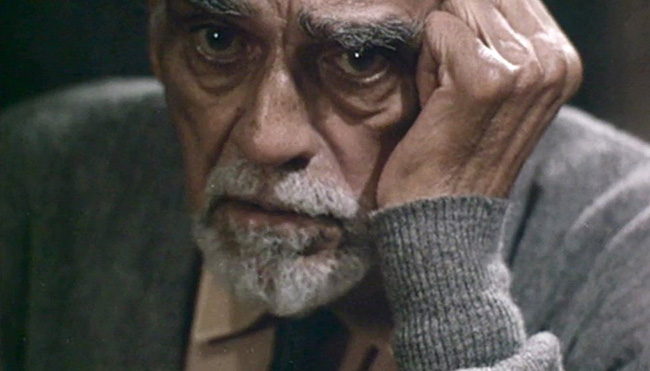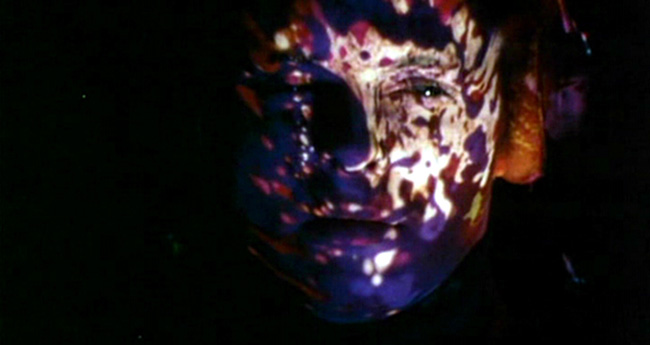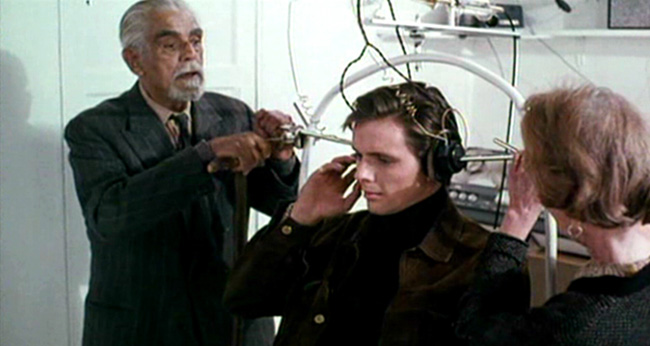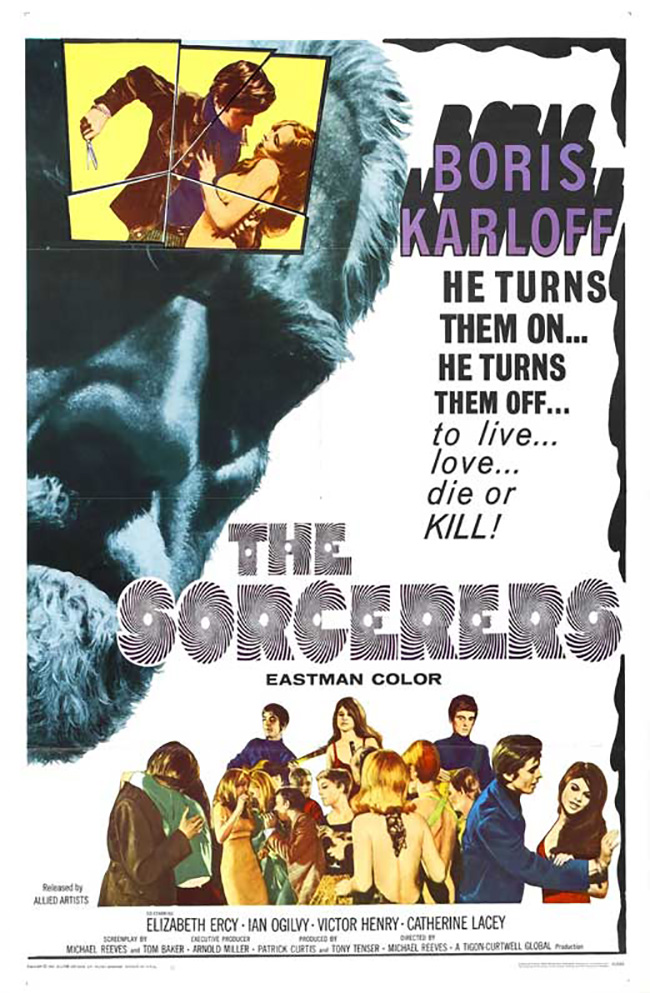
Swinging London takes center stage in The Sorcerers (1967), an unusual horror film with science fiction elements featuring a late career performance from Boris Karloff and directed by cult icon Michael Reeves. Reeves made his reputation on the strengths of his next film, Witchfinder General (1968), widely considered to be one of the best British horror films of the 1960’s. But not long after that film’s release, Reeves died of an accidental barbiturate overdose on February 11, 1969. He was only 25 years old, but he had already directed three films (the other one being The She Beast, with Barbara Steele), and served as a second unit and assistant director on several others. Despite his experience, there is still a sense in The Sorcerers of a young, creative man cutting his teeth in filmmaking. It’s a very low budget film, made for the playboy producer Tony Tenser (who produced Polanski’s Repulsion) and Tenser’s Tigon Productions, which specialized in poverty row exploitation films, most in the horror or sexploitation genre. (Tigon’s finest achievement would be the sublime and chilling Satanic panic horror film of 1971, The Blood on Satan’s Claw.) The chief exploitation element in The Sorcerers is the presence of Karloff, who was 78 when the film was shot, and would pass away two years later. Karloff looks frail, though it is to his advantage that the film requires him to be a more sympathetic, somewhat pitiful character. He is not playing a formidable boogeyman, but a mad scientist who discovers that the real monster he’s created…might be his own wife.

Mike (Ian Ogilvy) subjects himself to a mind-altering experiment.
The setting is the hip London scene that its young director likely knew very well. Mike (Ian Ogilvy, who appeared in each of Reeves’ films) is a cool, reserved young man in the David Hemmings/Blow-Up mold who hangs out at clubs listening to (bad) psychedelic bands and flirting with the pretty Nicole (German actress Elizabeth Ercy, Phaedra), despite the fact that one of his friends is interested in her. While walking the streets late one night, he encounters Dr. Marcus Monserrat (Karloff), who offers him a mind-expanding trip better than LSD. At the promise of the next bold new experience, Mike takes the bait, but is surprised that their destination is the doctor’s modest, drab-looking home, where his wife, Estelle (Catherine Lacey, The Lady Vanishes, The Mummy’s Shroud), awaits. He’s taken into a back room with white walls and lab equipment, and sits in a chair, allowing the doctor and his wife to attach an electrical apparatus to his head. A projector illuminates his face with a psychedelic light show like those projected behind Pink Floyd at the local UFO Club; it’s a visual technique used in the same year’s The Trip (1967). When the performance is over, Dr. Monserrat and his wife have hypnotized Mike. They command him to leave the house with no memory of what’s transpired. And as he goes about his evening – including a late night swim with Nicole – the Monserrats discover that their experiment is a success: they have become telepathically linked to Mike, and can experience his physical sensations a la Netflix’s Sense8.

Dr. Monserrat (Boris Karloff) hooks Mike up to his machine with the help of Estelle Monserrat (Catherine Lacey).
Dr. Monserrat encourages disconnecting from Mike before the telepathic sessions go too long, but Estelle becomes addicted to the vicarious sensations. She discovers that her ability to control Mike can overpower her husband’s, and a sociopathic streak emerges. She commands Mike to start physical alterations with his friends. When Mike visits his Ex, Audrey (a young Susan George, Dirty Mary Crazy Larry), to confess that he’s having blackout periods where he can’t recall what he’s done, Estelle compels him to stab her to death with a kitchen knife. He then strangles a singer (Sally Sheridan, On Her Majesty’s Secret Service) from the club he frequents. Estelle brings her new propensity for violence into her housebound world, as she clubs her husband, leaving him slumped, paralyzed, on the floor; then she continues driving Mike to further and further extremes, while his friends Nicole and Alan (Victor Henry, Privilege) begin to suspect Mike of the murders. She doesn’t take heed of the fact that when Mike is cut, the wounds also appear on her and her husband – signs that the experiment might prove dangerous for more than just their subject. The simple but clever premise of The Sorcerers, as conceived by John Burke (his original screenplay was rewritten by Reeves and his Witchfinder General co-writer Tom Baker) allows for a science fiction/horror tale with no special effects or elaborate sets. It even permits its elderly stars, Karloff and Lacey, to perform all their scenes in one location, and mostly seated at a table. Reeves shoots in the streets, clubs, and back alleys of London – as well as an antiques shop with the unfortunate name “The Glory Hole” – to keep the budget low enough to satisfy Tenser and Tigon. It’s a modest thriller, but an inventive one, with a satisfying ending to match the Gothic yarns for which Karloff had become a legend. But mostly The Sorcerers was a proving ground for Reeves’ next effort, a period picture that would be much more challenging, ambitious, and grand in scope, and starring another horror legend, Vincent Price.










